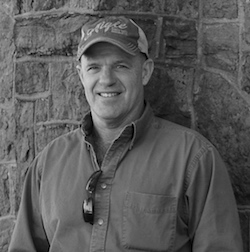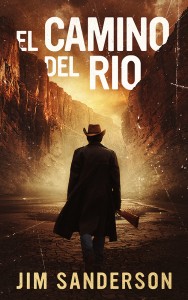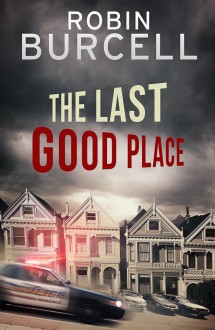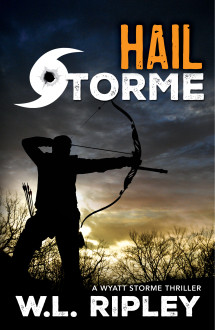
Jim Sanderson is the author of El Camino Del Rio, an amazing crime novel that has won enormous, well-deserved praise from readers, critics and authors alike. But it took a while for Jim to achieve that success… time he spent, as he puts it, gathering hyphens and adjectives. And he learned that sustaining that ‘hyphenated’ success is even harder. Here’s his story…
For years I was an “unknown writer” before I became an “unknown Texas writer.” Then, I had a very good year and had two books come out. An essay collection made me a “little-known Texas writer,” and a novel made me a “Texas mystery writer.” To succeed financially or critically, a writer needs a niche, a label, and the more hyphens or more adjectives before the word “writer” the better. The business of being labeled doesn’t belong to the writer. So, without knowing what I was doing, I began a year-long acquisition of labels and hyphens.
The Redneck-Chauvinist-Writer
I had previously gotten a label by writing essays about what I thought was obvious. But what was obvious to me was scandalous to others. An editor friend of mine who published my essay “Texas and Women” got more letters of complaint for that essay than for anything else he had ever published. He was happy to have the cheap advertising. Editors from another journal had read the same essay and sent it back to me with all sorts of scurrilous comments and threats. So I was a sort of a red neck-chauvinist writer with this essay. Likewise, other essays had gotten complaints from fundamentalists, scholars, and college administrators. So based on the individual essays, I was hoping to sell copies of my essay collection because I was a crude, redneck, unscholarly writer. But alas, as I was warned, individual essays don’t sell. Folks were more content to read one of my essays than a whole bunch of them.
While I was editing my essay manuscript, I learned that I had won an award for the best fiction about the rural Southwest. The prize was a chunk of money and publication of the novel, El Camino del Rio, by a university press. For fifteen years I had been trying to publish a novel, so I was ecstatic. I was no longer an “unknown-Texas-writer” but a “rural-Southwestern-novelist.”
The Rural-Southwestern-Novelist
My editor for El Camino del Rio admitted to me that she was glad I had won because I was a Texas writer and because Texans support their own. A small press with a few copies of a book could count on Texans buying Texas books. Every bookstore in Texas has a Texana section. I doubt that Ohioans have an Ohiana section. So I thought I was to be a “Texas” novelist. I started shopping for a pair of boots. But in a stroke of fate or genius, my editor decided that the novel was a mystery and made “a mystery” a part of the title. I liked the tough-guy image that “mystery writer” connoted. Had it not been summer, I would have bought a trench coat. And I gave up on a pair of boots.
The essay collection “appeared” first. I say appeared because, almost by magic, a box containing copies of this book appeared at my door. It had never seemed real before, but now in my hands, was a purple and red cover with my name and title. And just as wondrous was the feeling that that gilded look and design made the writing better. A few months later, I received El Camino del Rio. That first edition had a stylish black cover with gold lettering and some neat blue and silver images suggested by the novel. I hoped that you could judge a book by its cover.
 I was right about the covers. My mother walked into a new book store in town and saw my essay collection stacked in front of the store. She found an assistant manager and asked why my book was so prominently displayed. Was it selling well? It was the assistant manager’s responsibility. She had just graduated from Texas A&M University and, since my book was published by A&M and since the color of the cover matched the decor of the store, she decided to give it a prominent display. Later, several people told me that they bought my novel because of its “interesting” cover. Writers just write the things; the true artists are the designers. I was a writer-of-pretty-books.
I was right about the covers. My mother walked into a new book store in town and saw my essay collection stacked in front of the store. She found an assistant manager and asked why my book was so prominently displayed. Was it selling well? It was the assistant manager’s responsibility. She had just graduated from Texas A&M University and, since my book was published by A&M and since the color of the cover matched the decor of the store, she decided to give it a prominent display. Later, several people told me that they bought my novel because of its “interesting” cover. Writers just write the things; the true artists are the designers. I was a writer-of-pretty-books.
The Texas Mystery Writer
In the meantime, my hard-working editor got galleys to the right people so that this Texas boy’s pretty mystery novel got reviewed as a mystery. A manager for a mystery bookstore in Houston read El Camino del Rio and liked it. And rumor had it that when the New York Times called this bookstore to ask what it’s employees were recommending, this twenty-something guy told them my novel. And this Texas boy, published by a university press, got reviewed by the New York Damn Yankee Times. I began seeking out places to sign copies, speak, promote, or just be bothersome. I couldn’t dare admit that I didn’t know how to write a mystery.
Boxes of books appeared at my door. I would sign the books and then mail the post-paid boxes back to bookstores, mystery book collectors, and readers. I found that mystery readers, according to the labels, were choosy, well-educated, literary, and well-off. They bought hard cover books. I also learned that a signed first edition might be worth some real money if the writer became famous (or maybe more likely infamous), so at conventions and at rare bookstores, people could barter for signed copies of mysteries. Nobody commented much about my essay collection.
With sales of the novel, agents called. The drawers to my file cabinets bulged with the letters of rejections from publishers and agents. Most agents’ notes said something similar: that in this tight market an agent had to really “love” a novel to represent it. Suddenly, some agents loved me.
The Texas Literary Mystery Writer
From some genuinely gracious agents, I gathered that I was writing the latest popular genre: the literary mystery. My editor, the director of a small academic and literary press, asked about a sequel–preferably with as much or more action, sex, and drugs, along with the literary stuff. I thought that I had a prequel, so she wanted that novel. Within the small-press, mystery-publishing, mystery-selling, mystery-buying worlds, I was hot. I was a “literary pulp writer.”
While working on the sequel, and then a rewrite of another sequel, my editor kept encouraging me, “Jim, Jim more sex, more shootouts.” Her last commentary on my work was that my plots suck but that the scenes were sooo soulful. She also said that despite the sex and violence, I was really writing satires about the Texas male psyche. So to the University of New Mexico Press, I am now a soulful, psyche-satirizing, Texas, literary pulp writer–who, most important, is good for about 1000 sold copies during the first year.
The Soulful, Psyche-satirizing, Texas Literary Pulp Writer
But back to my first novel, El Camino del Rio, some publicity accompanied the publication. I got invited to literary events in Houston. In fact, I felt like I was kind of adopted by some Houston institutions. So my name appeared in the Houston Chronicle. Then of course, folks from the place where I teach and from the newspaper in the town where I lived called. Both wanted a story and wondered why I was becoming a Houston writer instead of a Beaumont writer. I just reasoned that no one in Beaumont cared much about writers or about me in particular.
Because I was a Texas-mystery-writer-writing-about-the-border, I had a telephone interview. The interviewer kept asking me about solving the political problems on the border. I ended up saying things like, “I just wrote it; I don’t know anything about politics,” and like my freshman students, I found myself saying, “Can’t it just be a story?”
In the meantime, I judged a fiction contest. I saw blurbs that categorized novels in all sorts of ways. I read mysteries, romances, literary mainstream, short stories, mass market, trade books, and crime novels. I felt a bit bogus as the judge because I didn’t know what the labels meant. I was particularly intrigued with the second novel in a series about a gay reporter. I thought the novel well-done, and I thought the author certainly had a unique niche: gay crime fiction. So I looked up some reviews of this novel and found that a reviewer had referred to the writer as one of the most prominent Midwestern-gay-crime writers. He had certainly done well in getting hyphens.
The Lucky Writer
At the start of the next year, since people called me a writer and since I had seen no real money, I used “writer” as the label for my second business. I got a deduction from the I.R.S., but the tax program I used kept warning me about the dangers of an audit. The I.R.S. doesn’t like “writers.”
So with one book that sold well for a small press publication and another that didn’t sell but to friends and disgruntled academics, I stumbled through several months like Alice in a wonderland of promotion and labels and earned hyphens in front of “writer.” I could, I guess, strike the pose of an “artist” and say that my writing should be above all labeling. But besides being pompous, that posture just wouldn’t be true. It especially would deny all the genuine concern, graciousness, kindness, and help that I received from publishers, agents, bookstore employees, and readers.
A bit naive, I was, like Alice, just so amused by it all that I felt nothing but wonder–even if I was not in the major tradebook league. I had made something and gotten a lot of help and advice from some talented people in order to get that product made and used. Other people thought that they could make some money helping me make some money with future products. And as with products and people, my book and I benefitted from some labels. The more hyphens in the label the better, the more sales.
As concerns my efforts at being any kind of a writer, all that I know for sure is that I got lucky, but luck is serendipitous; you have to work long and hard to be ready for the accidents. I am also lucky that, though most people don’t buy books, they are still interested in stories. So finally, I am lucky that I’m not a poet. Everybody “writes” poetry, but nobody buys it.
The Forgotten Writer
But the time of getting hyphens is now a long time ago. Stuff happened in between. My hyphens got rusty and eventually faded. An agent who had read El Camino del Rio (my precious, good-selling mystery novel) and rejected it offered to represent its prequel, Safe Delivery. But I had offered that novel to the editor and original publisher of El Camino del Rio. I was loyal, so I went with my new friends. Later, the agent I had rejected became the largest seller of mystery novels. Bile built up in me.
The El Camino sequels from this small press didn’t do as well as El Camino del Rio. My editor retired. The press that I was publishing with went a different direction, away from me. So when I contacted agents, they no doubt checked my sales, using Book Scan, a software program and database that shows just how many sales a writer has made. With each book, I was growing less marketable.
I eventually wrote the historical-western-adventure novel that I had been writing in my head for forty years. A small pressed published it, but no one read it. More important, no one bought it.
I wrote one novel after the other and could find no agent or publisher. Then I wrote short stories and put together collections. No one wanted these. I rewrote older novels, then rewrote them again. No one wanted these. An agent represented a novel, but then dropped me. His secretary forgot to send me the note that I was dropped. So, as far as books and I went, nothing happened, culminating in one agent’s advice that, given me and my sales record, neither my books nor I were “sexy” enough. I was no longer pretty. I needed a pseudonym so that I might be mistaken as pretty.
Becoming forgotten, I used hindsight to beat myself up because I didn’t have hindsight back then. I should have realized just how much of a business writing was and how much more of a failing business it has become. I should have realized that to stay publishing, a writer has to stay pretty and that pretty equals saleable.
The Rediscovered Writer
So I decided to forget pretty and go ugly. A friend with a respectable print-on-demand press published my short story collection, Faded Love, and it got nominated for a prize that I always coveted. Then he published the latest in the series that I started with El Camino del Rio, then another short story collection.
Then another small university press published a novel that the pretty big publishers didn’t want. Then another small university press invited me to edit a thirty year old contemporary novel that could now be seen as historical fiction. Then I found Brash Books, which is republishing El Camino Del Rio and its first sequel in new trade paperback and ebook editions.
So now I have had another small boom. I was a little prettier than I was but not as pretty as I once was. But I’m sure the bust and severe ugliness will come again. So I need to hurry up and start writing passably pretty.


